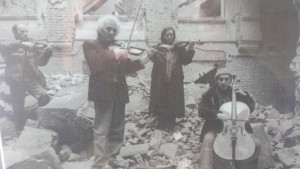“Those who knew what all this was about must make way for those who know little.”
Wislawa Szymborska (1923-2012)
Many unique aspects of Bosnian War, which took place from 1992-1995, stayed in the memory of many for sorrowful reasons that are defeating to the humanity. However, the role that arts played in preservation of human dignity of oppressed Bosnian people, particularly of citizens of besieged Sarajevo, will continue inspiring those who believe in the supremacy of the human spirit.
One of these impressive moral entities were four of Bosnia’s classically trained musicians: Dzevad Šabanagić (violin), Hrvoje Tisler (violin), Dijana Ihas (viola), and Miron Strutinski (cello), who constituted Sarajevo’s String Quartet. While sharing the fate of the rest of Sarajevo’s citizens who found themselves in the most un-dignifying living conditions due to the hatred that was falling on the city from the surrounding hills for the duration of time that has been identified as the longest siege of any city in the history of the humanity (siege of Sarajevo lasted 1425 days), these four musicians found the strength to uplift the dignity and sense of belonging to the humanity among isolated inhabitants of Sarajevo by presenting the city with 206 concerts. They continued rehearsing and restlessly performing while risking their lives, even after the original first violin (Momir Vlačić) and original second violinist (Kamenko Ostojić) of the war quartet lost their lives.
Quartet has been a subject of a documentary movie called “Sarajevo Strings” (available at Sarajevo String Quartet produced by Saga of Sarajevo) and its work in besieged Sarajevo was described in a chapter of a book called Sarajevo Roses by Anne Marie du Preez-Bezdrob.
I am My Story Live! (event program)
And the Quartet Played On (article)
